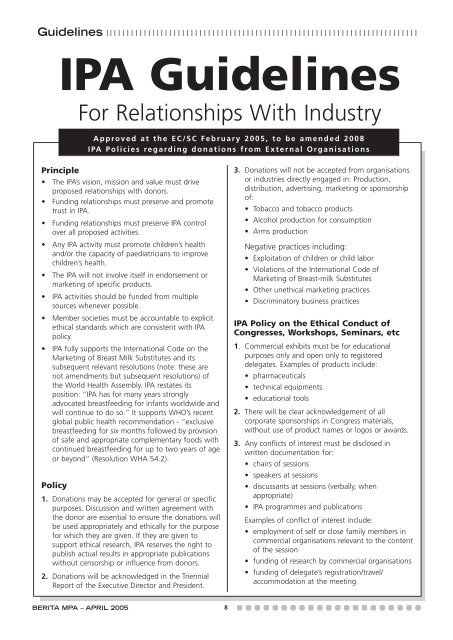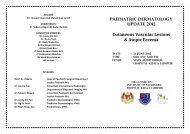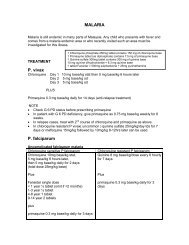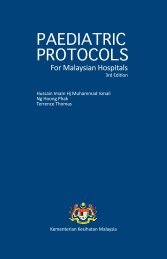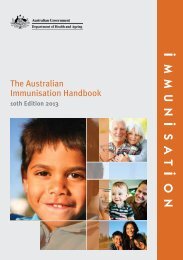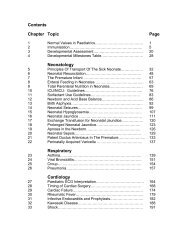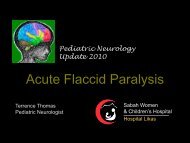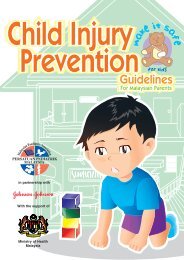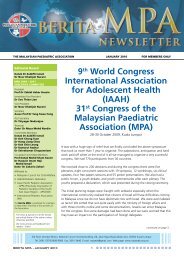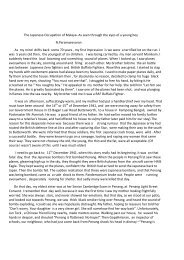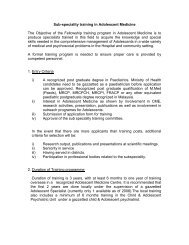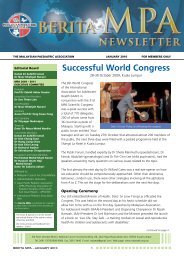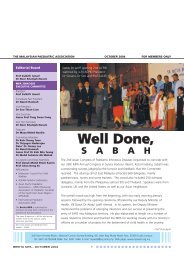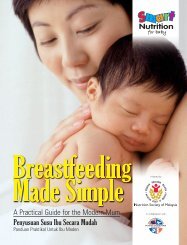Berita MPA April 2005 (English - pdf - 1652 Kb) - Malaysian ...
Berita MPA April 2005 (English - pdf - 1652 Kb) - Malaysian ...
Berita MPA April 2005 (English - pdf - 1652 Kb) - Malaysian ...
Create successful ePaper yourself
Turn your PDF publications into a flip-book with our unique Google optimized e-Paper software.
Guidelines<br />
Principle<br />
• The IPA’s vision, mission and value must drive<br />
proposed relationships with donors.<br />
• Funding relationships must preserve and promote<br />
trust in IPA.<br />
• Funding relationships must preserve IPA control<br />
over all proposed activities.<br />
• Any IPA activity must promote children’s health<br />
and/or the capacity of paediatricians to improve<br />
children’s health.<br />
• The IPA will not involve itself in endorsement or<br />
marketing of specific products.<br />
• IPA activities should be funded from multiple<br />
sources whenever possible.<br />
• Member societies must be accountable to explicit<br />
ethical standards which are consistent with IPA<br />
policy.<br />
• IPA fully supports the International Code on the<br />
Marketing of Breast Milk Substitutes and its<br />
subsequent relevant resolutions (note: these are<br />
not amendments but subsequent resolutions) of<br />
the World Health Assembly. IPA restates its<br />
position: “IPA has for many years strongly<br />
advocated breastfeeding for infants worldwide and<br />
will continue to do so.” It supports WHO’s recent<br />
global public health recommendation - “exclusive<br />
breastfeeding for six months followed by provision<br />
of safe and appropriate complementary foods with<br />
continued breastfeeding for up to two years of age<br />
or beyond” (Resolution WHA 54.2).<br />
Policy<br />
IPA Guidelines<br />
For Relationships With Industry<br />
Approved at the EC/SC February <strong>2005</strong>, to be amended 2008<br />
IPA Policies regarding donations from External Organisations<br />
1. Donations may be accepted for general or specific<br />
purposes. Discussion and written agreement with<br />
the donor are essential to ensure the donations will<br />
be used appropriately and ethically for the purpose<br />
for which they are given. If they are given to<br />
support ethical research, IPA reserves the right to<br />
publish actual results in appropriate publications<br />
without censorship or influence from donors.<br />
2. Donations will be acknowledged in the Triennial<br />
Report of the Executive Director and President.<br />
BERITA <strong>MPA</strong> – APRIL <strong>2005</strong> 8<br />
3. Donations will not be accepted from organisations<br />
or industries directly engaged in: Production,<br />
distribution, advertising, marketing or sponsorship<br />
of:<br />
• Tobacco and tobacco products<br />
• Alcohol production for consumption<br />
• Arms production<br />
Negative practices including:<br />
• Exploitation of children or child labor<br />
• Violations of the International Code of<br />
Marketing of Breast-milk Substitutes<br />
• Other unethical marketing practices<br />
• Discriminatory business practices<br />
IPA Policy on the Ethical Conduct of<br />
Congresses, Workshops, Seminars, etc<br />
1. Commercial exhibits must be for educational<br />
purposes only and open only to registered<br />
delegates. Examples of products include:<br />
• pharmaceuticals<br />
• technical equipments<br />
• educational tools<br />
2. There will be clear acknowledgement of all<br />
corporate sponsorships in Congress materials,<br />
without use of product names or logos or awards.<br />
3. Any conflicts of interest must be disclosed in<br />
written documentation for:<br />
• chairs of sessions<br />
• speakers at sessions<br />
• discussants at sessions (verbally, when<br />
appropriate)<br />
• IPA programmes and publications<br />
Examples of conflict of interest include:<br />
• employment of self or close family members in<br />
commercial organisations relevant to the content<br />
of the session<br />
• funding of research by commercial organisations<br />
• funding of delegate’s registration/travel/<br />
accommodation at the meeting


